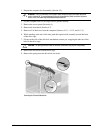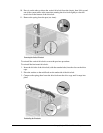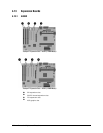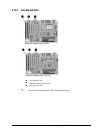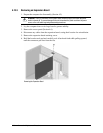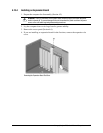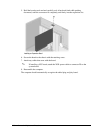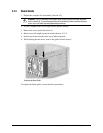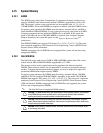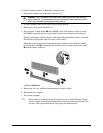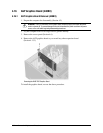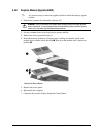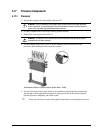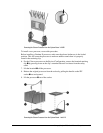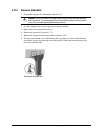
4-30 Removal and Replacement Procedures
4.15 System Memory
4.15.1 440BX
The 440BX comes with at least 16 megabytes of synchronous dynamic random access
memory (SDRAM) dual inline memory modules (DIMMs), upgradeable to 256 or 384
MB. The memory sockets on the system board can be populated with 16-, 32-, 64-, or
128-MB DIMMs. Self-refresh DIMMs are required on models with three DIMM sockets.
For proper system operation, the DIMMs must be industry standard 168-pin, 66-MHz or
faster unbuffered SDRAM DIMMs. If your system processor has a bus speed of 66 MHz,
Compaq recommends that any additional DIMMs also be 66 MHz. If the system bus
speed is 100 MHz, the use of 100-MHz DIMMs is required. (Run Compaq Computer
Setup to determine your system bus speed; see the
Software Reference Guide
for
instructions.)
The SDRAM DIMMs must support CAS Latency 2 or 3 (CL = 2 or CL = 3). They must
also contain the mandatory Joint Electronic Device Engineering Council (JEDEC) Serial
Presence Detect (SPD) information.
DIMMs constructed with x4 SDRAM are not supported; the system will not start using
unsupported DIMMs.
4.15.2 Intel 810/810e
The Intel 810 comes with at least 32 MB of SDRAM DIMMs and the Intel 810e comes
with at least 64-MB of SDRAM DIMMs, upgradeable to 512 MB.
The memory sockets on the system board can be populated with industry-standard
DIMMs. These memory module slots are populated by at least one preinstalled memory
module. To achieve the maximum memory support, you may be required to replace the
preinstalled DIMM with a higher capacity DIMM.
For proper system operation, the DIMMs must be industry standard 168-pin, 100 MHz,
unbuffered, PC100-compliant SDRAM DIMMs, depending on the model. The SDRAM
DIMMs must support CAS Latency 2 or 3 (CL = 2 or CL = 3). They must also contain the
mandatory Joint Electronic Device Engineering Council (JEDEC) Serial Presence Detect
(SPD) information. DIMMs constructed with x4 SDRAM are not supported; the system
will not start using unsupported DIMMs.
✎
The Intel 810 does not support 66-MHz memory.
CAUTION:
The DIMM sockets have gold metal contacts. When upgrading memory, it Is important
to use DIMMs with gold metal contacts (not tin-lead) to prevent corrosion and/or oxidation
resulting from having incompatible metals in contact with each other.
CAUTION:
Static electricity can damage the electronic components of the computer or optional
boards. Before beginning these procedures, ensure that you are discharged of static electricity by
briefly touching a grounded metal object.
CAUTION:
When handling a memory module, be careful not to touch any of the contacts. Doing
so can damage the module.



